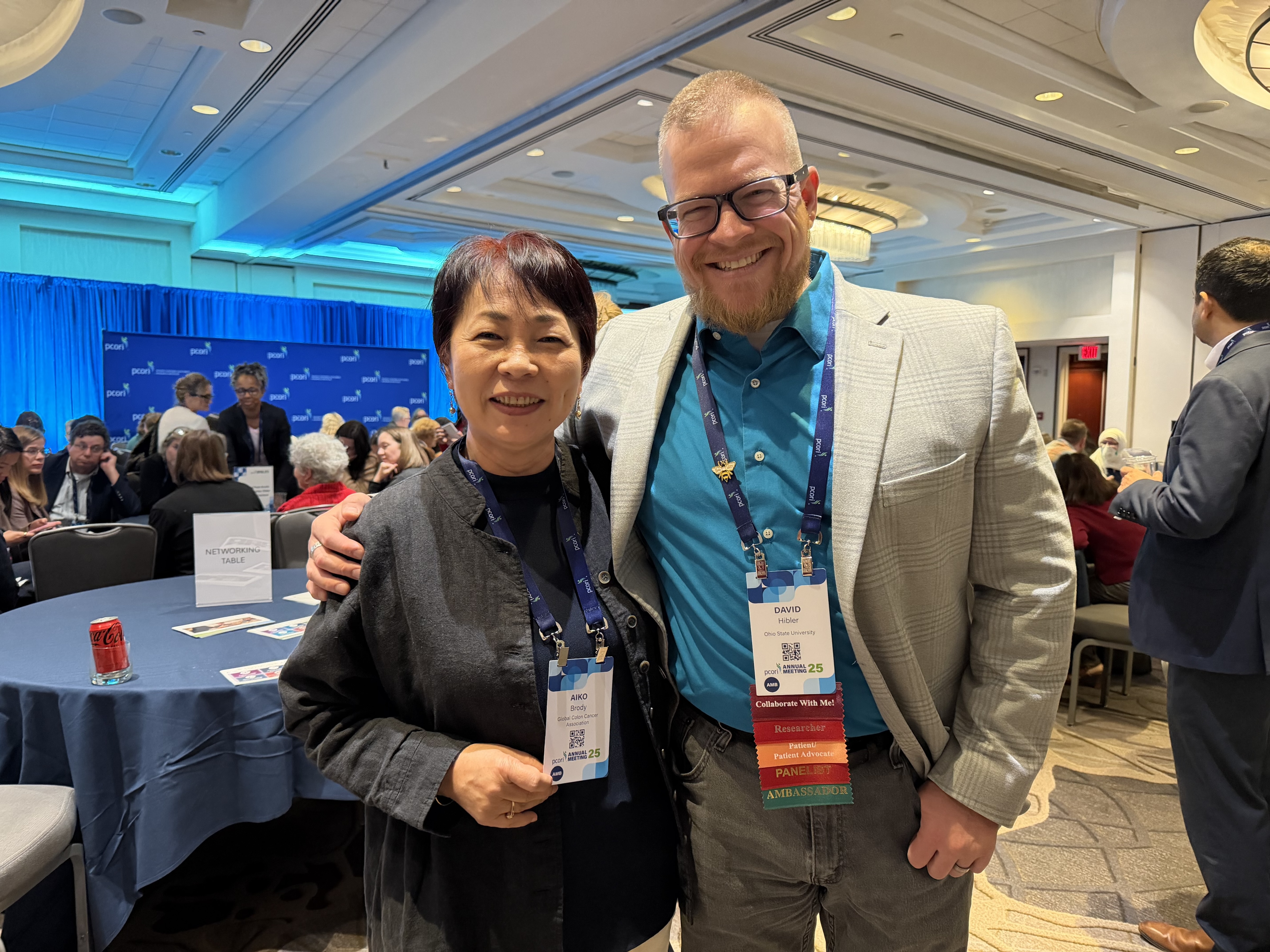Patient-Centered Outcomes Research Institute (PCORI) Annual Meeting

PCORI 2025
The Patient-Centered Outcomes Research Institute (PCORI) Annual Meeting was held on October 21–22 in Washington, D.C. I was honored to receive a scholarship and attend for the first time.
My goal in joining the PCORI meeting was to learn what kinds of research are being conducted with PCORI’s support and to understand the quality and impact of those outcomes. I was especially interested in how researchers make their studies truly patient-centered—both in language and in practice.
Since becoming involved with a New York-based program called DSRUPT, which focuses on educating minority communities about clinical trials, I’ve gained a deeper understanding of the barriers to participation in research. At the same time, through my work with the Global Colon Cancer Association (GCCA) mentoring Japanese advocates, I’ve seen how difficult it can be to bridge the communication gap between doctors and patients in Japan.
That’s why this opportunity felt so meaningful. I wanted to learn and share what I discovered—not only with Japanese people living in the U.S., but also with those back in Japan—so that we can begin to reshape doctor–patient relationships from the core.

My Experience at PCORI
The meeting was exceptionally well organized. I attended the Ambassador Workshop on October 20, just before the main event began. On that first day, one speaker said, “When communication with patients ends, research loses its meaning and the outcome becomes vague.” Those words struck me deeply.
When the main sessions began, the energy in the room was powerful. Researchers, patients, caregivers, healthcare professionals, and policy leaders from across the country gathered with a shared purpose—to make research more human and truly centered on the experiences and needs of patients.
One of the things that impressed me most was the openness of the discussions. Researchers spoke honestly about the challenges of involving patients as true partners, not just as subjects. Patients, in turn, shared what it means to participate in research that genuinely listens to their voices.
During a session about Artificial Intelligence, one speaker said, “We must not take humanity out of human research.” That simple but powerful statement perfectly captured the mission and heart of PCORI’s work.
And then came one of my favorite moments—when a speaker said with a smile, “Looking back, we’ll say this was the era when we did research without patient participation!” The audience laughed, but it carried a serious truth. These words resonated deeply with me because they reflected the very challenges I see among Japanese Americans and people in Japan—the distance between researchers and patients, and how much more we can achieve when we bridge that gap.
What I witnessed over those three days was PCORI taking meaningful steps to remove those barriers—by creating spaces for genuine dialogue, listening to diverse perspectives, and working toward a healthcare system where providers and patients can truly collaborate.
One speaker summed it up perfectly: “We need to let go of the idea that one size fits all in healthcare.” That message will stay with me for a long time.
Looking Ahead
Attending the PCORI Annual Meeting, I met many inspiring people who reminded me that true progress in healthcare begins with empathy, respect, and listening. Research is not just about data—it’s about people, their stories, and their hopes.
I left Washington, D.C., feeling motivated to bring what I learned back to my communities, both in the U.S. and in Japan. Whether through education, advocacy, or collaboration, I want to continue building bridges between patients and researchers—so that every person’s voice, no matter what their background is, can be part of shaping better healthcare for all.
---------
PCORI 年次総会 2025 に参加して
2025年10月21日〜22日、ワシントンD.C.で開催された Patient-Centered Outcomes Research Institute(PCORI:患者中心アウトカム研究所)年次総会 に、奨学金をいただき、初めて参加する機会を得ました。
今回の目的は、PCORIが支援する研究にはどのようなものがあり、その研究の質と成果をどの様に生み出しているのかを学ぶことでした。特に、研究者がどのような言葉を使い、どのようにして「患者中心の研究」を実現しているのかに強く関心を持っていました。
私は、ニューヨークを拠点とする DSRUPT というプログラムに参加し、マイノリティコミュニティに臨床試験についての教育を行う活動に関わっています。また、Global Colon Cancer Association(GCCA) を通じて日本の患者アドボケートを支援する中で、日本では医師と患者の間のコミュニケーションの壁を埋めることがいかに難しいかを痛感してきました。
だからこそ、今回の参加は私にとってとても意義のあるものでした。アメリカに住む日本人の方々はもちろん、日本にいる人たちにも、この経験を共有し、医師と患者の関係を根本から変えていくきっかけにしたいと思いました。
PCORIでの体験
会議のオルガナイズは非常にしっかりしており、私は本会議が始まる前日の10月20日に行われた アンバサダー・ワークショップ に参加しました。 初日に登壇したスピーカーのひとりがこう言いました。
「患者とのコミュニケーションが途絶えたとき、研究は意味を失い、その成果はあいまいなものになってしまう。」
この言葉は、私の胸に強く刺さりました。
本会議が始まると、会場のエネルギーはとても熱く、全米から集まった研究者、患者、介護者、医療従事者、政策リーダーたちが、「研究をより人間的なものにし、患者の経験やニーズを中心に据える」という共通の目的で集まっていました。
特に印象的だったのは、ディスカッションのオープンさです。 研究者たちは、患者を単なる「研究対象」ではなく「パートナー」として関わる難しさを正直に語り、患者側も「自分たちの声がきちんと聞かれる研究に参加するとはどういうことか」を率直に共有していました。
AIに関するセッションでは、ある登壇者がこう言いました。
「人間の研究から“人間らしさ”を取り除いてはいけません。」
このシンプルながらも力強い言葉こそ、PCORIの研究の使命と本質を象徴していると感じました。
そしてあるスピーカーが笑顔でこう言ったのです。
「振り返ってみたら、私たちは“患者抜きで研究していた時代”があったなんて言うかもしれませんね!」
会場は笑いに包まれましたが、その裏には深い真実を感じ、私のもう一つの感動の一瞬でした。
登壇された方やテーブルを交えた方の言葉は、私が日頃感じている課題──日本や日系アメリカ人社会における、研究者と患者の間にある距離、そしてそのギャップを埋めることでどれほどの可能性が広がるか──とまさに重なっていました。
3日間を通して私が目にしたのは、PCORIがその壁を乗り越えるために具体的な行動を取っている姿でした。互いの意見を聞き合い、率直な対話の場をつくり、医療提供者と患者が真に協働できるヘルスケアの実現に向けて努力しているのです。
あるスピーカーはこうまとめました。
「医療において、“誰にでも当てはまるひとつの形”という考えを手放さなければなりません。」
この言葉は、私の心に長く残ると思います。
これからに向けて
PCORI年次総会を通して、私は多くの刺激を与えてくれる人たちと繋がることができ、「医療の真の進歩は、共感・尊重・傾聴から始まる」ということを改めて感じました。 研究とはデータのことだけではなく、それぞれが実際に経験した事に対するその方達の希望そのものなのです。
ワシントンD.C.を後にして、私はアメリカと日本、両方のコミュニティにこの学びを伝えたいと強く感じました。教育、アドボカシー、そして協力し合うことで、患者と研究者の架け橋を築ければと思います。どこの国であれ、いろいろな立場の方の声が、より良い医療をつくる一部として尊重されるように活動をして行くことが私の願いです。
GCCA 患者アドボケートコンサルタント
ブロディー愛子
